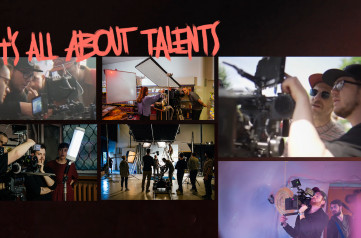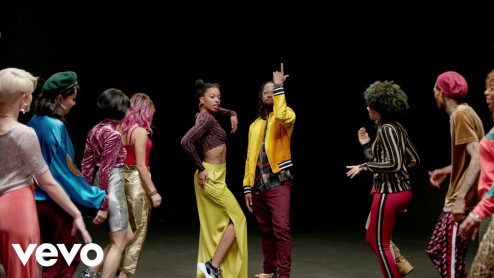
Send Your EP to a Robot. How Algorithms Shape the Careers of Musicians18.11.2018
The times when discovering new artists was only a matter of chance and the perceptiveness of A&R departments are slowly becoming a thing of the distant past. Nowadays, more often than not a “machine” will decide whether a career will take off or fizzle out. The question is whether its tastes are good enough for us to trust it?
It’s December 2017; crowds are assembling near the Charles Bridge in Prague. A loud party is roaring in Karlovy Lazne, a spot that brands itself as the biggest music club in Central Europe. It’s the only event of its kind – not only in the Czech capital, but probably in all of Europe. On the stage before the dancing crowd is KUKA – a somewhat stiff but still very efficient DJ. What he lacks in skill, he makes up with dancing – his moves are distinctive but slightly awkward. Well, that shouldn’t be all that surprising, KUKA’s a robot after all. It uses his powerful robotic arm to switch records, scratch like a pro, and operate the mixer. It’s doing quite well with the DJ thing, although not everyone’s happy with the set. Some claim that he doesn’t exactly follow the crowd’s moods. Well, if they knew that KUKA started out in the automotive rather than the entertainment industry, maybe they would have been more understanding.
The times when discovering new artists was only a matter of chance and the perceptiveness of A&R departments are slowly becoming a thing of the distant past. Nowadays, more often than not a “machine” will decide whether a career will take off or fizzle out. The question is whether its tastes are good enough for us to trust it?
It’s December 2017; crowds are assembling near the Charles Bridge in Prague. A loud party is roaring in Karlovy Lazne, a spot that brands itself as the biggest music club in Central Europe. It’s the only event of its kind – not only in the Czech capital, but probably in all of Europe. On the stage before the dancing crowd is KUKA – a somewhat stiff but still very efficient DJ. What he lacks in skill, he makes up with dancing – his moves are distinctive but slightly awkward. Well, that shouldn’t be all that surprising, KUKA’s a robot after all. It uses his powerful robotic arm to switch records, scratch like a pro, and operate the mixer. It’s doing quite well with the DJ thing, although not everyone’s happy with the set. Some claim that he doesn’t exactly follow the crowd’s moods. Well, if they knew that KUKA started out in the automotive rather than the entertainment industry, maybe they would have been more understanding.
No, that’s not the plot of a new Black Mirror episode, or a passage from a dystopian novel, it’s just another night in the city on the Vltava. And although the situation described above, having a robot DJ at a party, is still quite unusual, the truth is that most of us deal with a similar arrangement nearly every day. In our homes or out on strolls, with headphones plugged into our ears. It’s no secret, after all, that music streaming services – currently one of the main revenue sources for musicians – increasingly rely on algorithms for their recommendations. Thus, indirectly, machines shape our tastes and our music industry, and may even affect the trajectories of artists’ careers. Metaphorically speaking, it’s as if the aforementioned KUKA insisted on playing the same catchy tune by some underground artist at every single party, thus inspiring ever new crowds to give the artist a listen. And who knows – maybe one night, the crowd would include the owner of a renowned music label who would end up introducing said artist to the whole wide world.
The custom designed algorithm tries to blend our favorite music – as the classic quote goes, "the best songs are the ones we already know" – with new tracks that have something in common with our favorites, such as genre, artists, or any other relationship.
Careers Through Machines
The ability of algorithms to make or break a career is no sci-fi tale. Let’s take Spotify’s Discover Weekly playlists compiled for Spotify users. The recommendation system has been explained to me in detail by Maciej Gajewski, a journalist with Spider’s Web.
– The beauty of Discover Weekly lies in the fact that it’s not overseen by any human operator. That is why the mechanism can service every one of us individually. It pores over what we especially like to listen to on Spotify and what people with similar tastes listen to – says Gajewski. – The custom designed algorithm tries to blend our favorite music – as the classic quote goes, "the best songs are the ones we already know" – with new tracks that have something in common with our favorites, such as genre, artists, or any other relationship. It also trawls the playlists of other users with similar tastes for inspiration, so to speak. Popular tracks are given priority, but the algorithms also pore over trends: if a young, relatively unknown performer has been recently given more listening time from an appropriately large pool of users, then the algorithm may very well include them in the recommendation – he adds.
When I spoke about recommendation systems with Mariusz Herma, the man behind the popular Beehype platform and Polityka journalist, he also began by discussing Discover Weekly. Calling it an attempt to “humanize” algorithm, which he labeled an “interesting trend,” Herma also added that the system successfully maintains the pretense that the recommendations are served by a friend. And indeed, the appeal of the system is corroborated by the numbers. Some time after launching the feature, Spotify announced that out of 40 out of the 100 million of their users use it regularly. Plus, over half of people who discover new music that way listen to at least ten of the recommended tracks each week and at least one is then saved on their private “Favorites” list. Well, how does that translate to making or breaking careers, exactly? Given the numbers, the chance that artists with limited popularity could benefit from the system and expand their reach and grow their audience is actually relatively high. Provided, of course, they encounter a favorably disposed machine.
Then, I finally decided to check whether the recommendations are actually used by someone whose job it is to recommend and publish music. So I spoke about Discover Weekly with Krzysztof Kwiatkowski, the man behind the Trzy Szóstki fanpage, founder of a record label under the same name, and author of multiple public Spotify playlists. Well, it turns out that Krzysztof has used the feature a couple of times and was surprised at how well the service handled recommendations. Later he added, however, that he doesn’t use Discover Weekly anymore because he’s got enough recommendations as it is and simply doesn’t have the time for more.
Spotify as Record Label
Let’s keep in mind, however, the streaming services, and thereby their decisions and algorithms, will continue to exert a growing influence over the music industry. Mariusz Herma told me of a story published on bloomberg.com that seems to corroborate that notion. The story is about an artist working under the name Viaa, a former American Idol contestant. Initially, Viaa, real name Mia Coleman, didn’t enjoy stellar prospects as a singer – her 2017 single Lie had only 60,000 listens on Spotify. In her own words, the money she made off the streams were enough to buy her a couple of meals and a toy for her pug. Luckily for her, however, one of those listening was a Spotify executive, who decided to include her in a new program that allowed artists to upload their music directly to Spotify where it would be promoted to the service’s 191 million users. Was it effective? The first song Viaa released through the program topped a million listens within a year. The artist’s financial situation definitely improved, particularly given that her share of royalties was higher now that she didn’t have to split profits with any record label. The role of the latter has been taken over by the streaming service.
But back to the algorithms themselves – YouTube also offers considerable proof of their influence over the recording industry. Although he emphasized that doesn’t follow YouTube’s recommendations and doesn’t use the platform to find new music, Krzysztof Kwiatkowski acknowledged that he’s seeing constant improvement in its algorithms. In his view, out of 10 suggestions, between 5 and 6 should be to our liking, which he considers an excellent result. At the same time he noted that his expectations – as a person who’s constantly listening to something – will differ considerably from expectations harbored by someone less involved with music than he is. – YouTube adapts to the tastes of the latter. And advisably so – Kwiatkowski added.
The AI driving YouTube’s recommendation system trawls terabytes of data on user habits and decision each and every day. Using this data, the system tries to understand what sort of movies should it be recommending to users.
The “Popular” Section
That’s just it – the notion above seems to be corroborated by growing popularity of boy pablo, an indie band headed by a Norwegian kid of Chilean descent, the subject of a piece in last year’s Pigeons & Planes. Pablo and his band uploaded “Everytime” to YouTube, a Mac DeMarco-like track accompanied by a lo-fi music video. For the first couple of weeks, the video garnered only a couple thousand of views. The stats sailed up once someone shared the video on Reddit, punching the number up to between 25,000 and 30,000 views. Once it passed that threshold, the algorithm decided to feature “Everytime” in its Recommended section, resulting in the video being shown to thousands upon thousands of viewers. Soon, the viewing stats shot up dramatically, especially after YouTube began featuring the track on its homepage. Until today, “Everytime” has been viewer over fourteen million times. The wave of popularity also swept other tracks featured on the band’s channel, boosting their stats in a similar manner.
How did that happen? The AI driving YouTube’s recommendation system trawls terabytes of data on user habits and decision each and every day. Using this data, the system tries to understand what sort of clips should it be recommending to users. Its decisions are based on four parameters – not only the videos a user watches matter, but so do the videos they don’t, their previous ratings, as well as how long they play a given video for. That’s why an artist interested in reaching the broadest possible audience has to put every effort into convincing users to stick around until the very end of their video and then check out other films featured on their channel.
Interviews with boy pablo quickly reveal that their success wasn’t the result of a cold calculation. But other artists aren’t exactly wary of stepping up to the challenges stemming from the prevalence of recommendation systems and streaming services, whose influence can even be seen in the trends emerging across the recording industry today. One example of such a trend is the fact that chart-toppers have been getting shorter and shorter (easier to keep the audience engaged, higher replayability). The website Quartz has even go so far as to compile a list that compared the total running time of tracks featured on the Billboard 100 list. The comparison quickly revealed that the curve has been consistently nosediving ever since the year 2000. And in 2018, most chart-toppers barely crack the 210-second-long mark!
Will algorithms continue to shake up the music industry? Well, that will depend on the industry’s disposition. – Spotify’s biggest competitor, Apple Music, prefers the "human" approach and entrusts the drafting of its playlists to human curators. But Discover Weekly remains unsurpassed – not only because of the efficiency of its algorithms but also due to the sheer number of Spotify users that the algorithms can train on – says Maciej Gajewski optimistically of the “inhuman” model and its future. The man behind the Trzy Szóstki label, on the other hand, takes a different view: – Let’s not fool ourselves – relying on algorithms will bring us a lot of new, interesting sounds, but will in turn lock us inside a bubble, a spacious one, but a bubble nevertheless.
Everything is shifting toward the algorithms, which themselves have been looking beyond just the signals that we consciously hand over to the system, such as listening/viewing or rating data.
On the other hand, "human recommendations" are usually boring, predictable, and rather uninspired, so the whole thing kind of evens out. The ideal solution would be to merge the two, producing what we might consider the best shot we have at creating a satisfying recommendation system – Kwiatkowski claimed. Finally, Mariusz Herma noted that although they use different approaches, Apple and Spotify actually have the same goal, namely to become the Netflix of music (as the platform is known for incessantly tuning its own recommendation algorithms. – A year ago Spotify bought a French start-up that developed "listening algorithms", that analyze music from a lot of different angles and produce insightful recommendations. Spotify probably already fed every shred of user data it has managed to collect over the past ten years into the AI. But barely a couple of months later Apple announced that it bought Shazam for some astronomical price. This acquisition was also about Shazam’s algorithms for music analysis and user behavior tracking – Herma said. – Everything is shifting toward the algorithms, which themselves have been looking beyond just the signals that we consciously hand over to the system, such as listening/viewing or rating data. Age, background, device, time of year/day of the week/time of day, friends – all of that is probably already subject of analysis, or soon will be – he added.
And despite the controversy growing around the usage of huge databases (“the machines not only track us, but now they influence our tastes”), the Polityka reporter acknowledges that ultimately no one will mind, because only results matter in the end. – Facebook and their ilk have clearly showed us that comfort is all that matters to us, and what happens behind the scenes is of no consequence. Only some kind of political scandal could reverse the course, but that seems unlikely for a music streaming service – Herma said. But even if that were to happen, the journalist added, the controversy would die down rather quickly. At least as quickly as any controversy around Google, a company which made its billions from personalizing search results.
see also
- Discover Your Talent. The 8th Edition of Papaya Young Directors Contest Just Round The Corner
 Papaya Young Directors
Papaya Young DirectorsNews
Discover Your Talent. The 8th Edition of Papaya Young Directors Contest Just Round The Corner
- Haruki Murakami to open Institute featuring donated vinyl record collection

News
Haruki Murakami to open Institute featuring donated vinyl record collection
- Longing For Cinemas? Make A Video For Multikino At Papaya Young Directors
 Papaya Young Directors
Papaya Young DirectorsNews
Longing For Cinemas? Make A Video For Multikino At Papaya Young Directors
- Mick Champayne | The Future (of Gaming) is Female
Trends
Mick Champayne | The Future (of Gaming) is Female
discover playlists
-
Seria archiwalnych koncertów Metalliki
 07
07Seria archiwalnych koncertów Metalliki
-
Original Series Season 1
 03
03Original Series Season 1
-
Nowe utwory z pierwszej 10 Billboard Hot 100 (II kwartał 2019 r.)
 15
15Nowe utwory z pierwszej 10 Billboard Hot 100 (II kwartał 2019 r.)
-
Cotygodniowy przegląd teledysków
 73
73Cotygodniowy przegląd teledysków
